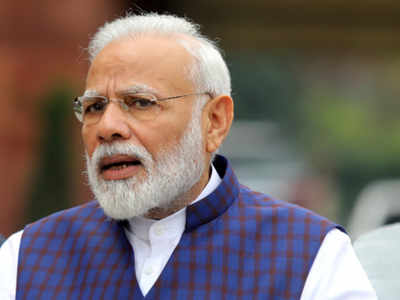- News
- India News
- PM Modi’s ‘nudges’ got 1.3bn people to join Covid fight, says Cambridge study
Trending
This story is from September 14, 2020
PM Modi’s ‘nudges’ got 1.3bn people to join Covid fight, says Cambridge study

PM Narendra Modi (Reuters)
LONDON: Using "nationalism" to "nudge" a country of 1.3 billion to treat the onset of the novel coronavirus as a juggernaut that would require a giant wall of public participation to stall, PM Narendra Modi's frequent public appearances and assurances in the initial days of the pandemic were critical to setting in motion India's response with an unprecedented 21-day lockdown, according to a Cambridge study that used machine learning and AI-based algorithms to identify the key interventions.
The peer-reviewed research article published in the scientific journal PLOS One contains the findings of an in-depth look into how the Centre formulated reactive policies to fight Covid-19, backed by critical "nudges" from the PM, employing a concept that proposes positive reinforcement and indirect suggestions as ways to influence the behaviour and decision-making of groups or individuals.
The article by Ramit Debnath and Ronita Bardhan, titled "India nudges to contain COVID-19 pandemic: A reactive public policy analysis using machine-learning based topic modelling", states that PM Modi's "nudging" was critical in creating "the herd effect".
"India locked down 1.3 billion people on March 25, 2020. Prime Minister Narendra Modi, in his address to the nation on 24th March 2020, appealed to the nation that ‘… 21 days is critical to breaking the infection cycle… or else the country and your family could be set back 21 years…’. This nudge had critical public policy implications because it successfully convinced 1.3 billion people to abide by lockdown rules at high economic and social costs," the paper says.
The paper estimates the economic costs of Phase 1 of the lockdown (March 25 to April 14, 2020) at US$ 98 billion (Rs 720,000 crore). The social costs are "still unknown", it says.
On Modi's bid to lessen the spiralling impact of the lockdown, the paper says, "The Prime Minister also nudged the business community and higher-income groups to look after the economic needs of those from lower-income groups, from whom they take various services, urging them not to cut their salary on the days they are unable to render the services due to inability to come to the workplace. PM stressed on the importance of humanity during such times."
The peer-reviewed research article published in the scientific journal PLOS One contains the findings of an in-depth look into how the Centre formulated reactive policies to fight Covid-19, backed by critical "nudges" from the PM, employing a concept that proposes positive reinforcement and indirect suggestions as ways to influence the behaviour and decision-making of groups or individuals.
The article by Ramit Debnath and Ronita Bardhan, titled "India nudges to contain COVID-19 pandemic: A reactive public policy analysis using machine-learning based topic modelling", states that PM Modi's "nudging" was critical in creating "the herd effect".
"India locked down 1.3 billion people on March 25, 2020. Prime Minister Narendra Modi, in his address to the nation on 24th March 2020, appealed to the nation that ‘… 21 days is critical to breaking the infection cycle… or else the country and your family could be set back 21 years…’. This nudge had critical public policy implications because it successfully convinced 1.3 billion people to abide by lockdown rules at high economic and social costs," the paper says.
"The populist Prime Minister frequently nudged the nation on staying at home, adhering to lockdown rules, improving immunity through yoga and Ayurveda and contributing to the PM-CARES fund."
The paper estimates the economic costs of Phase 1 of the lockdown (March 25 to April 14, 2020) at US$ 98 billion (Rs 720,000 crore). The social costs are "still unknown", it says.
On Modi's bid to lessen the spiralling impact of the lockdown, the paper says, "The Prime Minister also nudged the business community and higher-income groups to look after the economic needs of those from lower-income groups, from whom they take various services, urging them not to cut their salary on the days they are unable to render the services due to inability to come to the workplace. PM stressed on the importance of humanity during such times."
End of Article
FOLLOW US ON SOCIAL MEDIA










